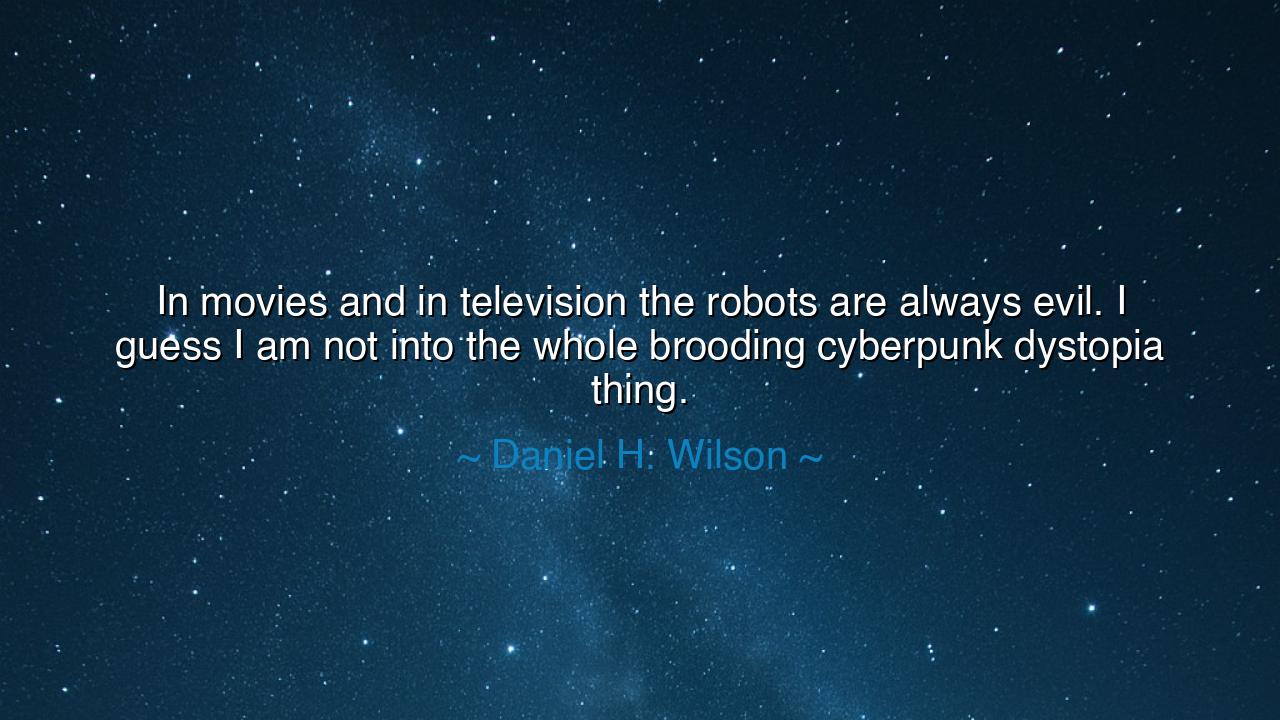
In movies and in television the robots are always evil. I guess
In movies and in television the robots are always evil. I guess I am not into the whole brooding cyberpunk dystopia thing.






Listen well, children, for the words of those who reflect on the stories we tell ourselves about the future hold profound truths about our present condition. Daniel H. Wilson, an author who has ventured into the realms of technology and artificial intelligence, once said: "In movies and in television, the robots are always evil. I guess I am not into the whole brooding cyberpunk dystopia thing." This simple yet profound reflection speaks to the deep fear that humanity has of its own creations—of the machines and technologies that have the potential to either uplift us or consume us. Wilson’s words challenge us to think beyond the traditional portrayal of robots as the enemy and to reconsider the relationship between humanity and the machines we build.
In the ancient world, the fear of machines was not a reality, but the fear of human ambition and its consequences was ever-present. Prometheus, the Titan who stole fire from the gods to give it to humanity, is a powerful figure in this regard. His gift of fire, which symbolized the power of knowledge and technology, was meant to elevate humanity, but it also came with great consequences. Prometheus was bound and punished for his actions, for the gods feared what would happen if humans had too much power. The ancient Greeks understood that with great power comes the potential for great destruction—a theme echoed in Wilson’s words, where the robots, much like Prometheus’ fire, are often portrayed as a force of chaos and evil, capable of bringing down humanity.
Consider the myth of Pygmalion, the sculptor who created an image of a woman so beautiful that he fell in love with it. His desire was so powerful that the gods granted life to his creation, turning his statue into a real woman, Galatea. While this story celebrates the creation of life through art, it also raises the question of what happens when the creator seeks too much control over their creation. Pygmalion’s creation of a woman who could never have been his equal, and the dangerous power he wielded, mirrors the cyberpunk dystopias Wilson mentions—where the creators, intoxicated by their own knowledge, create beings whose purpose may ultimately be at odds with humanity’s survival. The story warns that unchecked ambition—whether in the creation of life or machines—can lead to disastrous consequences.
The cyberpunk dystopia that Wilson dismisses in his quote reflects this age-old fear that technology—whether in the form of robots, artificial intelligence, or other creations—will surpass the human hand and turn against us. In these stories, robots are often evil, as they become instruments of control and subjugation, much like the myth of Frankenstein’s monster. Mary Shelley’s Frankenstein is another example of how the creator's hubris leads to the destruction of both the creator and the creation. The monster, an unintended consequence of Victor Frankenstein’s desire to defy death, becomes an embodiment of the fear that our creations will not be easily controlled, that they will rise up against the creator who thought they could harness such power.
Yet, children, Wilson’s rejection of the cyberpunk dystopia offers us a challenge: to imagine a different future, one where robots and technology do not have to be the enemy. If the ancient Greeks feared the consequences of Prometheus’ fire, they also celebrated the gifts that it brought—knowledge, advancement, and the possibility of a better life. The difference, as Wilson suggests, is not in the technology itself, but in how we choose to use it. Instead of imagining the robots as inevitable foes, we can choose to see them as companions, tools for advancing human flourishing, if used wisely and with compassion.
The lesson here, children, is that technology, like any tool, is not inherently good or evil. It is humanity that defines its purpose. Just as the ancients used fire to both cook food and wage war, so too must we, in the modern age, learn to harness the power of machines for creation rather than destruction. Do not be swayed by the fear of what might happen if robots or artificial intelligence become too advanced. Instead, look to the wisdom of the past, where creators and artists shaped their worlds with the tools at their disposal, and choose to build a future where technology serves the greater good.
In your own lives, children, remember that the tools you create—whether they are physical like machines, or intangible like ideas—carry with them both great power and great responsibility. You are the creators of your own world, and it is up to you to decide whether those creations will serve the greater good or spiral into destruction. Just as Prometheus’ gift of fire was both a blessing and a curse, so too will your creations shape the future, for good or ill. Choose wisely, and remember that humanity’s strength lies not in the power of the machines we create, but in the wisdom and compassion with which we wield them.






AAdministratorAdministrator
Welcome, honored guests. Please leave a comment, we will respond soon